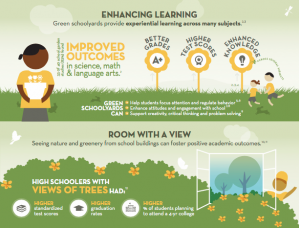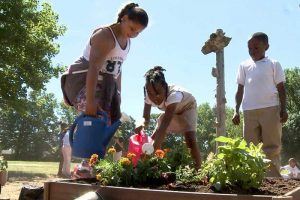Roots in the Ground is a comprehensive Farm to Early Care and Education (ECE) curriculum created by Rooted staff, partners, and consultants to guide in-person garden-based education and cooking trainings for ECE professionals. The curriculum is designed to help early childhood educators feel inspired and confident in gardening and cooking activities with young children. View Resource »
School Gardens Help Wisconsin Grow
 School gardens are an innovative way to improve student health and wellbeing and provide nutrition education, hands-on curricular activities, and outdoor opportunities for students of all ages. In many parts of Wisconsin, school gardens are a curricular mainstay to provide hands-on experience that will prepare students for future careers. This document provides talking points to help explain the wide-reaching benefits of garden-based education. View Resource »
School gardens are an innovative way to improve student health and wellbeing and provide nutrition education, hands-on curricular activities, and outdoor opportunities for students of all ages. In many parts of Wisconsin, school gardens are a curricular mainstay to provide hands-on experience that will prepare students for future careers. This document provides talking points to help explain the wide-reaching benefits of garden-based education. View Resource »
Making the Case: Case Studies on Green Schoolyards
 Why do green schoolyards matter and what are their benefits? These materials will help you advocate for your school garden program thanks to these success stories with notable outcomes. View Resource »
Why do green schoolyards matter and what are their benefits? These materials will help you advocate for your school garden program thanks to these success stories with notable outcomes. View Resource »
Benefits of Green Schoolyards Infographics
 This collection of free toolkits, reports, infographics and advocacy tools is designed to help you or your organization/institution connect children, families and communities to nature. These beautiful resources lay out the many reasons that green schoolyards benefit our youth and our communities, including academic, mental health, and physical activity benefits. View Resource »
This collection of free toolkits, reports, infographics and advocacy tools is designed to help you or your organization/institution connect children, families and communities to nature. These beautiful resources lay out the many reasons that green schoolyards benefit our youth and our communities, including academic, mental health, and physical activity benefits. View Resource »
School Gardens: Changing Lives & Communities
 A successful school garden doesn’t just require teamwork, it builds students’ teamwork skills. From academic rewards to healthier lifestyles, these helpful tidbits about the benefits of garden-based education can help with grant writing, promoting the idea of a garden within your community, or even spark ideas for lessons. View Resource »
A successful school garden doesn’t just require teamwork, it builds students’ teamwork skills. From academic rewards to healthier lifestyles, these helpful tidbits about the benefits of garden-based education can help with grant writing, promoting the idea of a garden within your community, or even spark ideas for lessons. View Resource »
